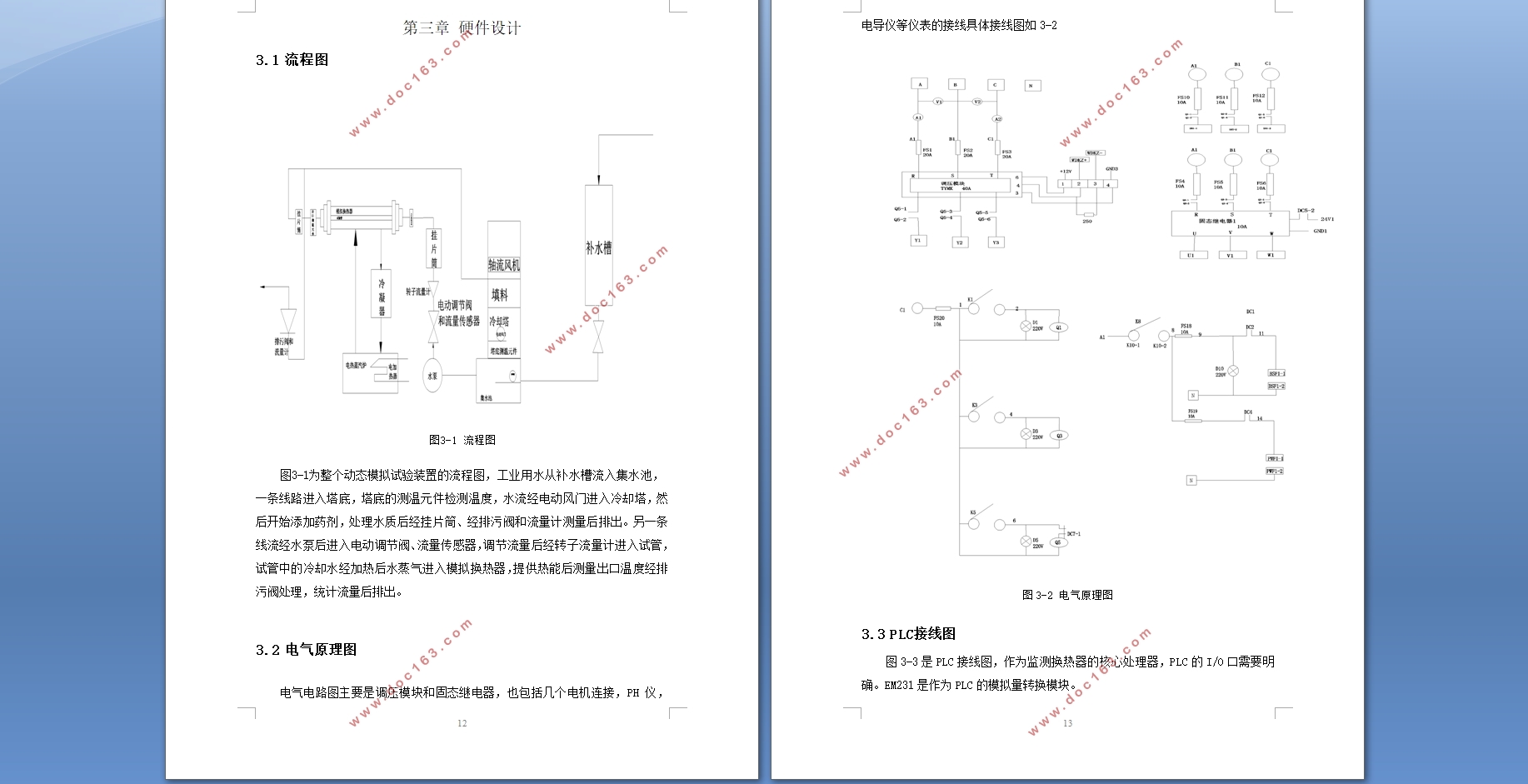基于PLC的动态模拟试验装置的设计(附PLC程序,CAD电路图)

基于PLC的动态模拟试验装置的设计(附PLC程序,CAD电路图)(任务书,开题报告,外文翻译,论文11000字,PLC程序,CAD电路图)
摘 要
本课题是研究一种冷却水动态模拟实验装置,主要是针对工业用水提供冷却循环使用的装置。近些年来伴随着我国经济的高速增长,大型工业发展速度的也随之加快,工业循环冷却水的用量逐年加大,企业为提高利润和降低冷却生产设备的成本,大规模地使用循环水来冷却设备,不仅环保而且节约成本。若循环水处理不当不仅会损坏生产设备,还会造成大面积的水体污染,所以需要一套模拟试验装置。
本套动态模拟试验装置是在采用西门子PLC S7-200系列可编程控制器基础上并且在上位机采用MCGS软件实现。该实验装置要求实现实时在线检测所需数值,要能够进行浓缩倍数,污垢沉积率,垢层厚度的计算;并能够实现PID的控制,自动检测所需的一些值;在MCGS上显示进口温度、出口温度、蒸汽温度、冷凝温度、PH、腐蚀率、电导率、热阻、沉积率、垢层厚度等数值,在PLC上检测所需数据,存储一定量历史记录并判断报警状态和报警数据;如有故障,可以自行诊断,并及时通知上位机。
关键词:PLC;MCGS;自行诊断;在线检测
Dynamic simulation test device based on PLC [来源:http://Doc163.com]
Abstract
This paper is to study the dynamic simulation of a water cooling apparatus, it is to provide a cooling apparatus for industrial water recycling. In recent years, our industry to accelerate the pace of development, industrial water consumption has gradually increased, companies to reduce cooling costs, extensive use of recycled water to cool the equipment, if the circulating water will not only damage the improper production equipment, will result in a large area of water pollution, so the need for a simulation test device.
The experimental device uses the Siemens S7-200 series PLC and PC using MCGS software. The experimental apparatus required to achieve real-time online detection of the desired value, to be able to concentrate ratio, soil deposition rate, layer thickness calculation scale; and be able to realize PID control, some values necessary for automatic detection; inlet temperature displayed on MCGS, Numerical outlet temperature, steam temperature, condensing temperature, PH, corrosion, electrical conductivity, thermal resistance, deposition rate, layer thickness and other dirt on the PLC to detect the required data is stored a certain amount of history and determine alarm status and alarm data; if you fail, you can self-diagnosis, and promptly notify the host computer. [资料来源:https://www.doc163.com]
Key Words:PLC;MCGS;Self-diagnosis;Line detection
[资料来源:http://Doc163.com]





[来源:http://www.doc163.com]
目 录
摘 要 I
Abstract II
目 录 III
第一章 绪论 1
1.1 课题背景 1
1.2 技术背景 2
1.3 课题研究的主要内容、要求介绍 2
1.4 方案设计及相关注意事项 3
1.5 课题研究目的 4
第二章 控制方案及软件、被测量介绍 5
2.1 控制方案选择 5
2.1.1 装置具体控制实现 5
2.2 PLCs7-200的工作原理 6
2.2.1 PLC的基本组成结构 6
2.2.2PLC的控制过程 7
2.2.3 PLC的技术特点及应用 8
2.3.4 关于PLC编程梯形图部分介绍 9
2.3 关于MCGS 10
2.4 试验内容涉及的相关数据介绍及测量方法的研究 11
2.4.1 腐蚀率的测定 11
2.4.2 污垢热阻的计算 11 [资料来源:http://Doc163.com]
2.4.3 电导率 12
2.4.4 PH 13
2.4.5 沉积率的计算 13
第三章 硬件设计 14
3.1 流程图 14
3.2 电气原理图 14
3.3 PLC接线图 15
3.4 端子图 16
第四章 软件设计 18
4.1 PLC编程要求 18
4.1.1模拟输入量 18
4.2 MCGS组态设计 18
4.2.1 MCGS界面 18
4.2.2 数据记录(半小时) 21
4.2.3 曲线走势:进口温度、蒸汽温度、流量、腐蚀、污垢热阻 21
4.2.4 参数设定(计算机上设定) 24
4.2.5 量程与校正(计算机上设定) 25
第五章 总结与展望 28
5.1 总结 28
5.2 展望 28
参考文献 29
致谢 30
[资料来源:https://www.doc163.com]
下一篇:基于PLC控制的加氯装置设计(附wincc程序,PLC程序,CAD电气原理图)
